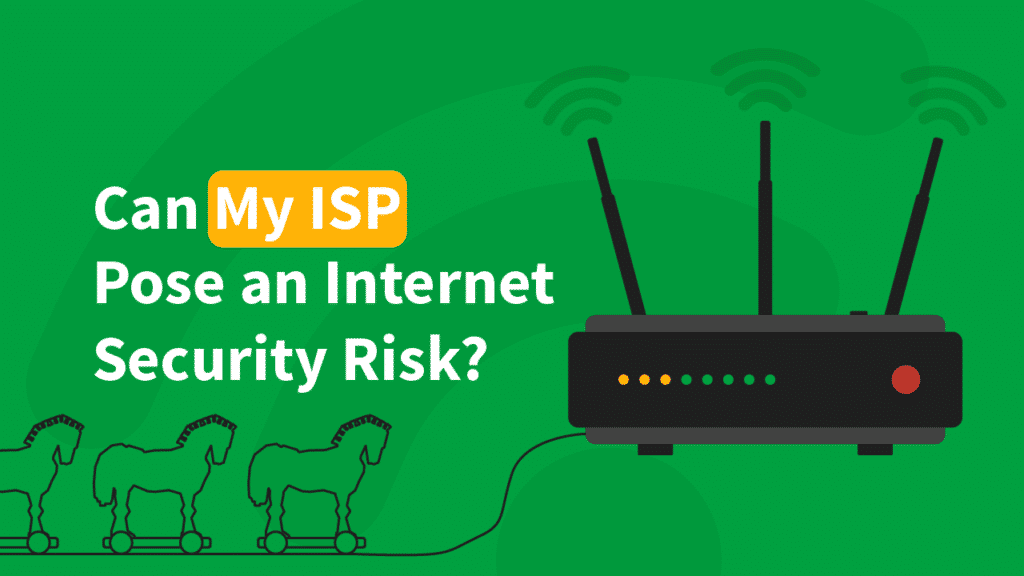Can My ISP Pose an Internet Security Risk?
Internet Service Providers (ISPs) hold a lot of influence in today’s world. They provide us internet facilities and also have a significant amount of data. Because of their significance, these services have also been victims of unrelenting attacks from hackers.
This reality has left them in dire situations, with many internet users calling for stricter punishments for companies that don’t secure themselves enough. ISPs can constitute security hazards. Let’s look at some of the security risks you stand to face through your ISP.
1. Port Redirection
Port redirection involves a third party acting behind the scenes to intercept data traffic headed for your computer’s port and redirecting it to a different IP address.
The port redirection attack means that data moving from your computer to the ISP and back isn’t safe. In some instances, the data could get picked and intercepted while in transit. In other cases, the data could get diverted altogether and never get to its destination.
Considering how much data is at stake, you could be looking at a loss of highly valuable information generally. While there are several ways to mitigate against such an attack, the threat is always present and can be dangerous in some specific situations.
2. Man-in-the-Middle Attack
Imagine you got an email that appeared to have come from your bank. The email asks that you log in with your financial information and provides a link for you to go to your banking portal from your email client.
You click the link, and you get redirected to what appears to be your bank’s website. You log in and do what you need to do.
In these situations, a middle “man” sent the email and made it look legitimate. The same “man” also created the bogus link and the fake site. It’s just that you’re not logging into your bank account — you’re only submitting your financial information to the hackers.
A man-in-the-middle attack can work with the hackers impersonating your ISP. While it isn’t entirely the ISP’s fault, impersonation scams like these tend to draw in many unsuspecting victims.
3. Social Engineering
The social engineering hack is one of the simplest. It involves hackers tricking an employee at your ISP into giving them your critical information and using such information against you.
The most common form of social engineering is known as SIM swapping. Essentially, a hacker buys a new sim and calls your ISP. They convince the employee that they’re you and need your details to access your platforms (banking, wallets, social media, etc.) on the “new” SIM.
Armed with this information, the hackers can do what they like.
While they’re not overly familiar, SIM swapping attacks can be quite devastating. Many have reported losses amounting to hundreds of millions as a result.
4. Distributed Denial-of-Service (DDoS) Attacks
The DDoS attacks are another highly common security flaw. They are also one of the most challenging attacks to get rid of. In this form of attack, hackers go after your ISP’s servers.
When conducting a DDoS attack, hackers overwhelm your ISP’s servers with traffic. The hackers would have loaded malware onto different computers on the network, and they use this traffic to bring down the servers.
Think of it as having a lot of cars on a highway. Cars prevent traffic from flowing regularly. DDoS attacks disrupt the data flow, and your device could even be at risk.
How Can ISPs Optimize Security?
All of these and more are some of the vulnerabilities that ISPs face when it comes to security. However, it’s also worth noting that ISPs have a role to play in ensuring optimal security as part of their service delivery. Some of these roles include:
Tightening Security and Internal Controls
The first responsibility for ISPs will be to look inward. Many ISPs today still have outdated security controls, and this leaves them at a significant disadvantage. While we can’t put all of our security liability on these companies, they also need to ensure that their security systems are top-notch.
Improved Training
ISPs are also responsible for training their employees. These employees will need training on how to stay vigilant in the face of suspicious data activity and spot possible social engineering attacks.
Monitoring More Data
There’s the argument that allowing ISPs to check data can lead to them exploiting this access for monetary gain. Supporters of privacy have argued that giving ISPs access to more peoples’ web browsing activities can lead to abuse.
However, the truth is that ISPs would need to have some level of data access. With this, they can understand browsing patterns, check for network vulnerabilities, and get alerted if any unusual activity is going on.
Conclusion
In a world where data is king, any entity that holds a significant amount will automatically become a target. ISPs understand this more than most. While their position makes them considerable security risks, they also have a responsibility to be better for their customers.

